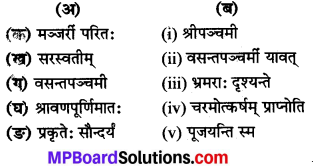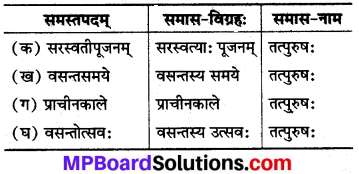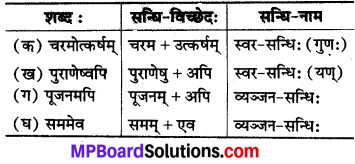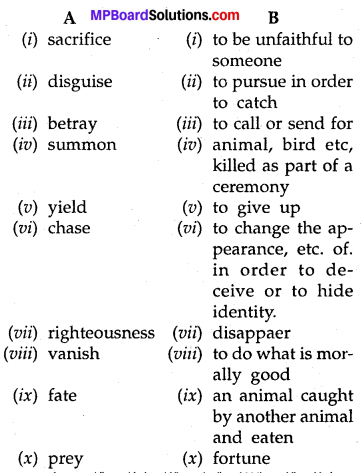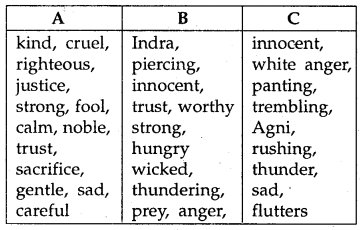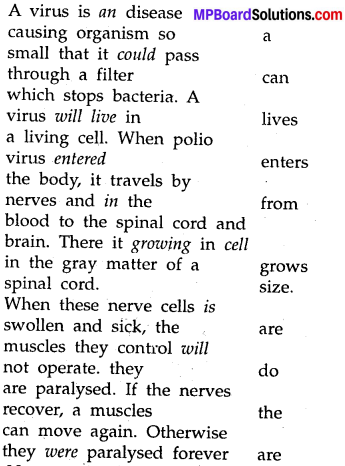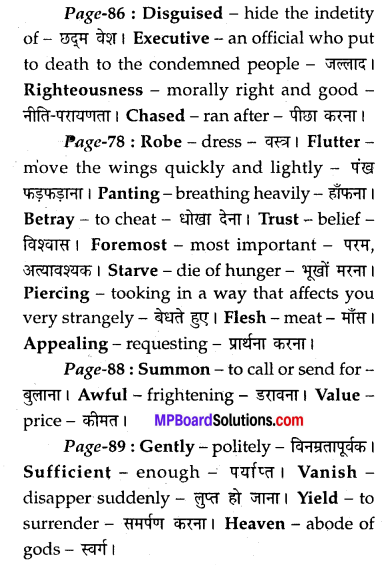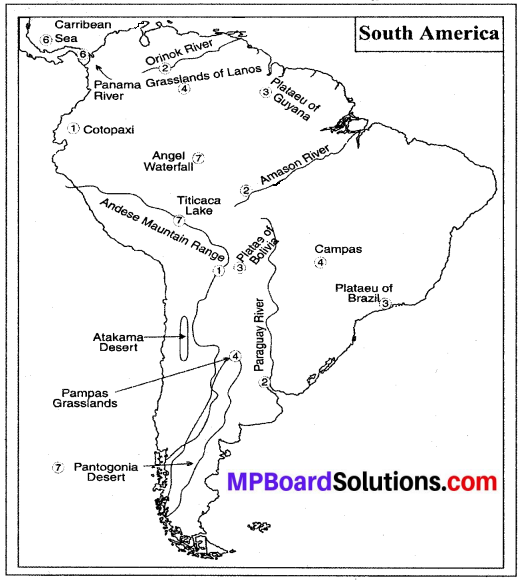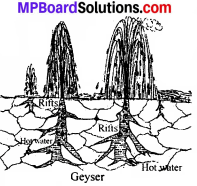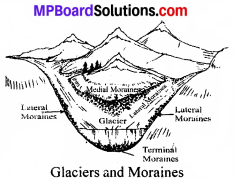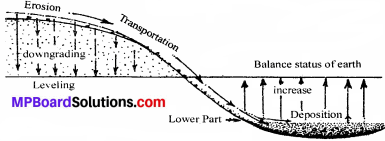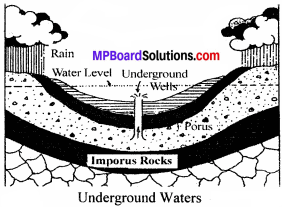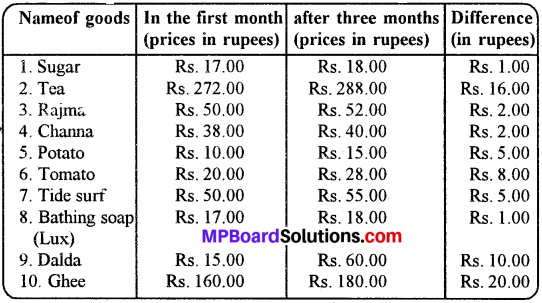MP Board Class 8th Hindi Bhasha Bharti Solutions Chapter 4 अपराजिता
MP Board Class 8th Hindi Bhasha Bharti Chapter 4 पाठ का अभ्यास
बोध प्रश्न
अपराजिता के प्रश्न उत्तर MP Board Class 8th प्रश्न 1.
निम्नलिखित शब्दों के अर्थ शब्दकोश से खोजकर लिखिए
उत्तर
विलक्षण = अनोखा; अकस्मात् = अचानक; विच्छिन्न = अलग किया हुआ, काटा हुआ; अभिशप्त शापित, शाप लगा हुआ; उत्फुल्ल = प्रसन्न; विषाद = दुःख, उदासी; बुद्धि दीप्ति = मेधावी, तेज बुद्धि वाला; जिजीविषा = जीने की इच्छा; कंठगत = गले में आना; उत्कट = प्रबल, तीव्र नियति = भाग्य; क्षत-विक्षत = घायल; आभामण्डित = तेज से युक्त; पटुता = चतुराई; ख्याति = प्रसिद्धि; आघात = प्रहार, चोट; व्यथा = कष्ट, रोग; नूरमंजिल = लखनऊ में स्थित मानसिक रोगियों का अस्पताल।
भाषा भारती कक्षा 8 Solutions Chapter 4 MP Board प्रश्न 2.
निम्नलिखित प्रश्नों के उत्तर संक्षेप में लिखिए
(क) अपराजिता संस्मरण की लेखिका कौन हैं?
उत्तर
अपराजिता संस्मरण की लेखिका गौरा पन्त ‘शिवानी’ हैं। वे हिन्दी की लोकप्रिय कथा-लेखिका हैं।
(ख) डॉ. चन्द्रा की माता जी का क्या नाम है ?
उत्तर
डॉ. चन्द्रा की माताजी का नाम श्रीमती टी. सुब्रह्मण्यम है।
(ग) डॉ. चन्द्रा को सामान्य ज्वर के बाद कौन-सी बीमारी हो गई थी?
उत्तर
डॉ. चन्द्रा को सामान्य ज्वर के बाद पक्षाघात की बीमारी हो गई जिससे गरदन के नीचे उनका सांग अचल हो गया।
(घ) ‘वीर जननी’ का पुरस्कार किसे मिला ?
उत्तर
‘वीर जननी’ का पुरस्कार अद्भुत साहसी जननी श्रीमती टी. सुब्रह्मण्यम को मिला। श्रीमती सुब्रह्मण्यम ने लगातार पच्चीस वर्ष तक सहिष्णुता के साथ अपनी पुत्री के साथ-साथ कठिन साधना की।
अपराजिता पाठ कक्षा 8 MP Board प्रश्न 3.
निम्नलिखित प्रश्नों के उत्तर विस्तार से लिखिए
(क) लेखिका की दृष्टि में डॉ. चन्दा सामान्य जनों से किन बातों में भिन्न थी ?
उत्तर
डॉ. चन्द्रा सामान्य जनों से अनेक बातों में भिन्न थीं। वे असामान्य रूप से शारीरिक अक्षमता व रोग से पीड़ित थीं। उनके शरीर का निचला धड़ निष्प्राण मांस पिण्ड मात्र था फिर भी वे सदा उत्फुल्ल रहती थीं। उनके चेहरे पर विषाद की कोई रेखा भी नहीं दिखती थी। उनमें अदम्य साहस और उत्कट जिजीविषा थी। उनके मुखमण्डल पर बुद्धि की दीप्तता झलकती थी। उनका व्यक्तित्व अनेक महत्त्वाकांक्षाओं से परिपूर्ण था। उन्हें अपने शरीर की अपंगता से बेचैनी नहीं थी।
उनमें अद्भुत साहस भरा था। उन्होंने अपनी थीसिस पर डॉक्टरेट की उपाधि ग्रहण की। वे कभी भी किसी से सामान्य-सा सहारा नहीं चाहती थीं। उन्होंने अपनी विलक्षणता से एम. एस-सी. में प्रथम स्थान प्राप्त करके बंगलौर (बंगलूरु) के प्रसिद्ध इंस्टीट्यूट ऑफ साइंस में अपने लिए स्पेशल सीट अर्जित की और बाद में शोधकार्य भी किया। राष्ट्रपति से गर्ल गाइड में स्वर्ण कार्ड पाने वाली प्रथम अपंग बालिका थी। उसमें संगीत के प्रति भी रुचि थी।
(ख) लेखिका ने जब चन्द्रा को कार से उतरते देखा तो वे आश्चर्यचकित क्यों रह गईं ?
उत्तर
लेखिका ने जब चन्द्रा को कार से उतरते देखा तो वे अचम्भित रह गईं। कार का द्वार खुला। एक प्रौढ़ा ने उतरकर पिछली सीट से ह्वील चेयर निकालकर सामने रख दी। कार में से एक युवती ने धीरे-धीरे अपने निर्जीव धड़ को बड़ी सावधानी से नीचे उतारा और बैसाखियों का सहारा लिया और ह्वील चेयर तक पहुँची तथा उसमें बैठ गई। अपनी हील चेयर को बड़ी तटस्थता से चलाती हुई कोठी के अन्दर चली गई। डॉ. चन्द्रा को नित्य नियत समय पर अपने कार्य करते देख चकित होती जब वह मशीन की तरह बटन खटखटाती अपना काम किये चली आती थी। डॉ. चन्द्रा अपनी अपंगता से बिल्कुल भी बेचैन नहीं लगती थीं। उनकी आँखों में अदम्य उत्साह और उत्कट जिजीविषा थी। उनमें महत्त्वाकांक्षाएँ भरपूर थीं। अत: उन्हें देखकर लेखिका अचम्भित रह गई।
Aparajita Chapter In Hindi Question Answer MP Board Class 8th प्रश्न 4.
निम्नलिखित पंक्तियों का आशय स्पष्ट कीजिए।
उत्तर
(क) बित्ते भर की लड़की मुझे किसी देवांगना से कम नहीं लगी।
आशय-लेखिका को अपंगता से ग्रसित लड़की देवांगना से कम नहीं लग रही थी। उसके चेहरे पर अद्भुत कान्ति थी। उसमें बुद्धिबल और आत्मनिर्भरता थी, यद्यपि वह शरीर से बहुत छोटी थी।
(ख) मैडम, मैं चाहती हूँ कि कोई मुझे सामान्य-सा भी सहारा न दे।
आशय-उस छोटे से आकार की अपंगता से ग्रस्त बालिका ने लेखिका से कहा कि वह नहीं चाहती है कि कोई भी व्यक्ति उसको थोड़ा भी सहारा दे। वह स्वावलम्बी बनकर रहना चाहती
(ग) चिकित्सा ने जो खोया, वह विज्ञान ने पाया।
आशय-लेखिका का कथन सही है क्योंकि चिकित्सा ने डॉ. चन्द्रा की अपंगता को ठीक नहीं किया जबकि विज्ञान के क्षेत्र में डॉ. चन्द्रा ने अनेक सफलताएँ प्राप्त की। डॉ. चन्द्रा ने बी.एस-सी. और एम. एस-सी. प्रथम श्रेणी में उत्तीर्ण और डॉ. सेठना के निर्देशन में पाँच वर्ष कार्य करते हुए पी-एच.डी. की उपाधि प्राप्त करके, विज्ञान के क्षेत्र में अपना अमूल्य योगदान दिया।
(घ) बुद्धिदीप्त आँखों में अदम्य उत्साह, प्रतिफलप्रतिक्षण भरपूर उत्कट जिजीविषा और फिर कैसी-कैसी महत्त्वाकांक्षाएँ।
आशय-लेखिका के अनुसार, डॉ. चन्द्रा की आँखों से ही । उनकी बुद्धि का तेज झलकता था। उनमें कभी न रुकने वाला उत्साह था। उन्हें किये गये कर्म के फल की प्राप्ति में विश्वास था। प्रत्येक क्षण अत्यन्त तीव्र एवं उत्कट रूप में जीवित रहने की इच्छा थी। इस पर भी उनमें अनेक महत्त्वाकांक्षाएँ थीं।
भाषा-अध्ययन
Aprajita Chapter Question Answer MP Board Class 8th प्रश्न 1.
निम्नलिखित शब्दों का उच्चारण कीजिएडॉक्टर, कॉलेज, बॉल, ऑफ, ऑफिस, कॉनवेन्ट।
उत्तर
अंग्रेजी के शब्दों को हिन्दी में प्रयोग करने से ‘ऑ’ ध्वनि का उच्चारण होता है। ऑ ध्वनि का आगम अंग्रेजी से हुआ है। अत: विद्यार्थी उपर्युक्त शब्दों को ठीक-ठीक पढ़कर उनका शुद्ध उच्चारण करने का अभ्यास करें।
अपराजिता’ पाठ के प्रश्न उत्तर MP Board Class 8th प्रश्न 2.
निम्नलिखित शब्दों का शुद्ध उच्चारण कीजिए और उन्हें लिखिए
व्यक्तित्व, रिक्तता, अभिशप्त, विच्छिन्न, निष्प्राण, जिजीविषा, बुद्धिदीप्त, सुब्रह्मण्यम।
उत्तर
विद्यार्थी उपर्युक्त शब्दों को ठीक-ठीक पढ़कर उनका शुद्ध उच्चारण करने का अभ्यास करें। फिर उन्हें लिखें।
अपराजिता पाठ के प्रश्न उत्तर MP Board Class 8th प्रश्न 3.
सही विकल्प चुनिए
(क) ‘अपराजिता’ शब्द में उपसर्ग है
(1) अ
(2) अप
(3) अपरा
उत्तर
(3) अपरा
(ख) ‘विकलांगता’ शब्द में प्रत्यय है
(1) गता
(2) ता
(3) आगत
उत्तर
(2) ता
(ग) ‘अभिमान’ में उपसर्ग है
(1) अभि
(2) अ
(3) मान
उत्तर
(1) अभि
(घ) ‘अपराजिता’ का विलोम है
(1) जीता
(2) जिता
(3) पराजिता।
उत्तर
(3) पराजिता।
अपराजिता कहानी का सारांश MP Board Class 8th प्रश्न 4.
‘अपराजिता’ पाठ से साधारण वाक्य, मिश्रित वाक्य और संयुक्त वाक्य के दो-दो उदाहरण छाँटकर लिखिए।
उत्तर
साधारण वाक्य
- उस कोठी का अहाता एकदम हमारे बँगले के अहाते से जुड़ा था।
- आजकल वह आई.आई.टी. मद्रास (चेन्नई) में काम कर रही हैं।
मिश्रित वाक्य
- हमें लगता है कि भले ही उस अन्तर्यामी ने हमें जीवन में कभी अकस्मात् अकारण ही दण्डित कर दिया हो।
- लौटते समय किसी स्टेशन पर चाय लेने उतरा कि गाड़ी चल पड़ी।
संयुक्त वाक्य
- हमने आज तक दो व्यक्तियों द्वारा सम्मिलित रूप में नोबेल पुरस्कार पाते अपने ही विषय में सुना था, किन्तु आज हम शायद पहली बार इस पी-एच. डी. के विषय में भी कह सकते हैं।
- एक वर्ष तक कष्टसाध्य उपचार चला और एक दिन स्वयं ही इसके ऊपरी धड़ में गति आ गई, हाथ हिलने लगे, नहीं उँगलियाँ मुझे बुलाने लगी।
Aprajita Class 8 MP Board प्रश्न 5.
निम्नलिखित गद्यांश को ध्यान से पढ़िए मैंने शारीरिक रूप से विशेष आवश्यकता वाले एक बालक को पैर से लिखते देखा तो मैं दंग रह गया। भगवान की लीला भी विचित्र है। साहसी, आत्मविश्वासी और जीवट स्वभाव के ऐसे विशेष आवश्यकता वाले कुछ व्यक्ति तो हमें हतप्रभ बना देते हैं। समाज में इस प्रकार के कुछ व्यक्ति तो अपने हथियार डाल देते हैं तथा दूसरों के आश्रित रहकर जीवन जीते हैं। कभी वे मन्दिर के सामने, कभी स्टेशन के पास या किसी सार्वजनिक स्थान पर माँगने के लिए धरना दिये बैठे रहते हैं। हमें चाहिए कि हम उन्हें अपने पैरों पर खड़े होने के लिए प्रेरित करें।
उन्हें स्वावलम्बी बनाने के लिए हर सम्भव प्रयास करें और उन्हें अच्छा जीवन जीने का मार्ग सुझाएँ।
(क) उपर्युक्त गद्यांश का उचित शीर्षक लिखिए।
(ख) हम विशेष आवश्यकता वाले व्यक्तियों के लिए क्या-क्या काम कर सकते हैं ?
(ग) इस गद्यांश से मुहावरे छाँटकर उनके अर्थ और वाक्य-प्रयोग कीजिए।
(घ) इस गद्यांश में से एक-एक सरल, मिश्रित और संयुक्त वाक्य छाँटकर लिखिए।
उत्तर
(क) ‘शारीरिक रूप से विशेष आवश्यकता वाले व्यक्ति’।
(ख) हम उन्हें अपने पैरों पर खड़े होने के लिए प्रेरित कर सकते हैं। उन्हें स्वावलम्बी बनाने के लिए हर सम्भव प्रयास कर सकते हैं तथा उन्हें अच्छा जीवन जीने का मार्ग सुझा सकते हैं।
(ग) मुहावरे
- दंग रह जाना-अचम्भे में पड़ जाना।
वाक्य प्रयोग-आठ वर्ष की बालिका ने जब गीता के श्लोक मौखिक सुनाए, तो वहाँ उपस्थित लोग दंग रह गये। - हतप्रभ-चकित हो जाना।
वाक्य प्रयोग-हमारे विद्यालय की विकलांग बालिका ने जब 100 मीटर की दौड़ में प्रथम स्थान पाया, तो उपस्थित लोग हतप्रभ हो गये। - हथियार डालना-हार मान लेना।
वाक्य प्रयोग-भारतीय सेना के समक्ष हमारे दुश्मनों ने अपने हथियार डाल दिये। - धरना देना-एक स्थान पर जमकर बैठ जाना।
वाक्य प्रयोग-छात्रों ने अपनी मांगों के समर्थन में प्रधानाचार्य के कार्यालय के सामने धरना दे दिया। - अपने पैरों पर खड़ा होना-स्वावलम्बी हो जाना।
वाक्य प्रयोग-प्रत्येक युवक को अपने पैरों पर खड़ा होने के सद्प्रयास करने चाहिए। - मार्ग सुझाना-उपाय बताना।
वाक्य प्रयोग-बेरोजगारी मिटाने के लिए विद्वानों को मार्ग सुझाना चाहिए।
(घ) सरल वाक्य-भगवान की लीला विचित्र है।
मिश्रित वाक्य-हमें चाहिए कि हम उन्हें अपने पैरों पर खड़े होने के लिए प्रेरित करें।
संयुक्त वाक्य-उन्हें स्वावलम्बी बनाने के लिए हर सम्भव प्रयास करें और उन्हें अच्छा जीवन जीने का मार्ग सुझाएँ।
प्रश्न 6.
निम्नलिखित गद्यांश को उपयुक्त विराम चिह्न लगाकर पुनः लिखिए
नहीं मिसेज सुब्रह्मण्यम मदर ने कहा कि हमें आपसे पूरी सहानुभूति है पर आप ही सोचिए कि आपकी पुत्री की हील चेयर कौन पूरे क्लास में घुमाता फिरेगा। आप चिन्ता न करें मदर मैं हमेशा उसके साथ रहूँगी और फिर पूरी कक्षाओं में अपंग पुत्री की कुर्सी की परिक्रमा मैं स्वयं कराती।
उत्तर
“नहीं, मिसेज सुब्रह्मण्यम”, मदर ने कहा। हमें आपसे पूरी सहानुभूति है, पर आप ही सोचिए, आपकी पुत्री की ह्वील चेयर कौन पूरे क्लास में घुमाता फिरेगा।
“आप चिन्ता न करें, मदर, मैं हमेशा उसके साथ रहूँगी” और फिर पूरी कक्षाओं में अपंग पुत्री की कुर्सी की परिक्रमा मैं स्वयं कराती।
प्रश्न 7.
‘सुगम’ शब्द में ‘ता’ प्रत्यय जोड़कर ‘सुगमता’ नया शब्द बना है। इसी प्रकार निम्नलिखित शब्दों में निर्धारित प्रत्यय जोड़कर नए शब्द बनाइए
उत्तर
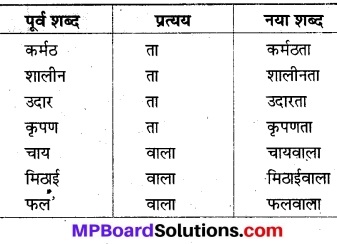

प्रश्न 8.
प्रतिफल’ शब्द में ‘प्रति’ उपसर्ग जुड़ा है। इसी प्रकार प्रति’, ‘परा’ और ‘अभि’ उपसर्ग जोड़कर नए शब्द बनाइए और लिखिए।
उत्तर
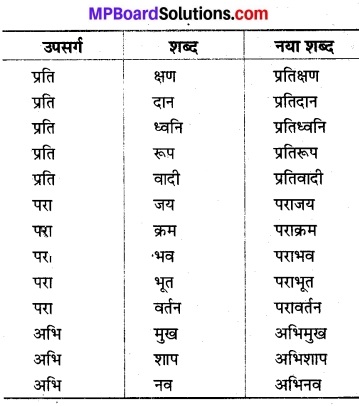
अपराजिता परीक्षोपयोगी गद्यांशों की व्याख्या
(1) कभी-कभी अचानक ही विधाता हमें ऐसे विलक्षण व्यक्तित्व से मिला देता है, जिसे देख स्वयं अपने जीवन की रिक्तता बहुत छोटी लगने लगती है। हमें तब लगता है कि भले ही उस अन्तर्यामी ने हमें जीवन में कभी अकस्मात् अकारण ही दण्डित कर दिया हो किन्तु हमारे किसी अंग को हम से विच्छिन्न कर, हमें उससे वंचित तो नहीं किया।
शब्दार्थ-विधाता = ईश्वर; विलक्षण = अनोखे; रिक्तता = खालीपन, अन्तर्यामी = हृदय में समाये हुए ईश्वर; अकस्मात् = अचानक; अकारण = बिना कारण के विच्छिन्न = अलग कर देना, काट देना; दण्डित कर दिया हो = दण्ड दिया गया हो; वंचित = अलग।
सन्दर्भ-प्रस्तुत गद्यांश हमारी पाठ्य-पुस्तक’ भाषा-भारती’ के पाठ ‘अपराजिता’ से अवतरित है। इस पाठ की लेखिका ‘शिवानी हैं।
प्रसंग-प्रस्तुत गद्यांश में लेखिका बताती हैं कि जीवन में कभी-कभी ऐसे व्यक्तियों से मिलना हो जाता है जिनको देखकर हमारे जीवन में किसी बात की कमी बहुत छोटी लगती है।
व्याख्या-कभी-कभी ऐसा अकस्मात् होता है कि हमारी मुलाकात किसी ऐसे अनोखे व्यक्ति से हो जाती है जिसे देखने मात्र से ही हमारे जीवन में किसी बात की कमी होते हुए भी बहुत छोटी लग उठती है। जिनसे मुलाकात हुई है, उन्हें कोई भी बड़ा कष्ट हो सकता है जिसके विषय में हमने कभी सोचा भी नहीं होगा और हमारे कष्ट उस व्यक्ति की तुलना में बहुत ही छोटे हो सकते हैं। ईश्वर हमें अचानक ही किसी भी प्रकार का कष्ट देकर हमें कभी भी दण्ड दे सकते हैं जिसका कोई कारण नहीं भी हो सकता हो। तब ईश्वर की फिर भी हम बड़ी कृपा समझते हैं जिन्होंने हमारे शरीर के किसी अंग को काट करके हमें उससे रहित नहीं किया।
(2) यहाँ कभी सामान्य-सी हड्डी टूटने पर या पैर में मोच आ जाने पर ही प्राण ऐसे कण्ठगत हो जाते हैं जैसे विपत्ति का आकाश ही सिर पर टूट पड़ा है, और इधर यह लड़की है कि पूरा निचला धड़ सुन्न है, फिर भी बोटी-बोटी फड़क रही है। आजकल वह आई.आई.टी. चेन्नई में काम कर रही है।
शब्दार्थ-सामान्य-सी = साधारण-सी, कम महत्त्व की; कण्ठगत = गले में अटके; आकाश ही सिर पर टूट पड़ा है = बहुत बड़ी विपत्ति एकदम आ गई है; सुन = संवेदनहीन; बोटी-बोटी = शरीर का प्रत्येक अंग; फड़क रही है- स्पन्दित या गतिमान हो रहा है।
सन्दर्भ-पूर्व की तरह।
प्रसंग-लेखिका के अनुसार शरीर के किसी भी अंग में थोड़ी-सी चोट लगने पर हम सोचने लगते हैं कि मानो हमारे प्राण ही निकल जायेंगे।
व्याख्या-कभी-कभी हम ऐसा समझते हैं कि कभी हमारे शरीर की साधारण-सी हड्डी टूट गईं हो अथवा हमारे पैर में मोच आ गई हो तो हमें ऐसा लगता है कि मानो कष्ट से हमारे प्राण ही गले में आ जायेंगे अर्थात् हमारी मौत ही हो जायेगी। हम सोचने लगते हैं कि हमारे ऊपर कठिनाइयों का आसमान ही टूट पड़ा है। परन्तु इधर देखिये इस छोटी-सी लड़की को, जिसके शरीर का निचला भाग किसी भी संवेदना से रहित है। उसमें किसी भी तरह की गति नहीं है। फिर भी उसके शरीर का प्रत्येक अंग स्पन्दित हो रहा है। यह वह लड़की है जो आई. आई. टी. मद्रास (चेन्नई) में आजकल काम कर रही है।
(3) मैडम, मैं चाहती हूँ कि कोई मुझे सामान्य-सा सहारा भी न दे। आप तो देखती हैं, मेरी माँ को मेरी कार चलानी पड़ती है। मैंने इसीलिए एक ऐसी कार का नक्शा बनाकर दिया है, जिससे मैं अपने पैरों के निर्जीव अस्तित्व को भी सजीव बना दूंगी।
शब्दार्थ-मैडम = श्रीमती जी; सामान्य-सा-थोड़ा भी, साधारण-सा; सहारा = मदद; निर्जीव = बिना प्राणों के, अथवा चेतनाहीन; अस्तित्व = बने रहने को; सजीव = सचेतन।
सन्दर्भ-पूर्व की तरह।
प्रसंग-लेखिका द्वारा छोटी-सी अपंग लड़की के साहस का वर्णन किया गया है।
व्याख्या-वह छोटी-सी लड़की लेखिका से कहने लगी है कि मैडम (श्रीमती जी) मेरी इच्छा है कि कोई भी व्यक्ति मेरी थोड़ी भी मदद करने के लिए तैयार न हो। मैं नहीं चाहती कि कोई भी आदमी रंचमात्र भी मुझे सहारा दे। वह बालिका स्पष्ट करती है कि उसकी माँ को उसके लिए कार चलानी पड़ती है। इस तरह किसी पर आश्रित रहने को दूर करने के लिए उस बालिका ने एक इस तरह की कार का नक्शा बनाया है, जिसे वह स्वयं चला सके और अपने निर्जीव पैरों को सजीव बना सके अर्थात् वह स्वयं – उस कार को अपने उन पैरों से चला सकेगी, जो निश्चेष्ट हैं और उनमें किसी भी तरह की चेतना नहीं है। इसका नतीजा यह होगा कि उनमें फिर से सजीवता आ जायेगी।
(4) “इसके भयानक अभिशाप के बावजूद मैंने कभी विधाता से यह नहीं कहा कि प्रभो, इसे उठा लो। इसके इस जीवन से तो मौत भली है। मैं निरन्तर इसके जीवन की भीख माँगती रही। केवल सिर हिलाकर यह इधर-उधर देख भर सकती थी। न हाथों में गति थी, न पैरों में फिर भी मैंने आशा नहीं छोड़ी। एक आर्थोपैडिक सर्जन की बड़ी ख्याति सनी थी, वहीं ले गई।”
शब्दार्थ-भयानक = खतरनाक; अभिशाप = शाप: । बावजूद = (इसके) होने पर भी; विधाता ईश्वर से उठा लो= मृत्यु दे दो; मौत = मृत्यु; भली = अच्छी; निरन्तर = लगातार, रोजाना; भीख माँगती रही = दीन भाव से माँग करती रही; गति = चेतना; आर्थोपैडिक- हड्डियों से सम्बन्धित; सर्जन = चीर-फाड़ करने वाला;
ख्याति = प्रसिद्धि।
सन्दर्भ-पूर्व की तरह।
प्रसंग-उस छोटी-सी बालिका के रोगग्रस्त होने की दशा में भी उसकी माँ के धैर्य और उसके प्रति माँ की ममता का वर्णन लेखिका ने बहुत ही भावपूर्ण ढंग से किया है।
व्याख्या-उस अपंग बालिका के शुरू के जीवन के विषय में उसकी माँ कहती है कि उसे अपंगता का भयानक शाप लगा हुआ होने पर भी उसने (बालिका की माँ ने) ईश्वर से कभी भी यह नहीं कहा कि हे परमात्मा, तुम इस बालिका को मृत्यु दे दो। ममता भरे हृदय वाली माँ ने कभी भी यह नहीं सोचा कि उसकी उस पुत्री के रोग पीड़ित होने की दशा से तो उसका मरना ही ठीक है। वह माँ तो सदैव यही प्रार्थना करती रही कि हे प्रभो उसे जीवन दो। अर्थात् उसको रोग से मुक्ति मिले। वह माँ निश्चित ही कितनी दु:खी होती होगी, जब वह अपनी पुत्री को निश्चेष्ट शरीर से हिल-डुलने में असमर्थ पाती थी, क्योंकि वह तो केवल अपने सिर को ही हिला पाती थी और केवल सिर हिलाकर इधर-उधर देख पाती थी। उसके हाथ और पैरों में कोई गति नहीं थी। इतना भयानक कष्ट होने और जीवन के प्रति निराशा के भर जाने पर भी उस बालिका की माँ निराश नहीं हुई। वह जिस किसी भी चिकित्सक (हड्डियों से सम्बन्धित) की प्रसिद्धि और नाम सुनती तो वह उस रोग से पीड़ित बालिका को उसके पास लेकर पहुंचती थी।
(5) लैदर जैकेट के कठिन जिरह-बख्तर में कसी उस हँसमुख लड़की को देख मुझे युद्ध क्षेत्र में डटे राणा साँगा का ही स्मरण हो आता था। क्षतविक्षत शरीर में असंख्य घाव, आभामंडित भव्य मुद्रा।
शब्दार्थ-लैदर जैकेट = चमड़े से बनी जैकेट; बख्तर = कवच; कसी = कस कर बाँधी हुई; राणा साँगा = मेवाड़ के वीर राजपूत राजा का नाम जो महाराणा प्रताप के पूर्वज थे; स्मरण = याद आ जाती थी; क्षत-विक्षत = बहुत अधिक घायल; असंख्य = अनेक; आभामण्डित = कान्ति से शोभायमान; भव्य = सुन्दर;मुद्रा = आकृति।
सन्दर्भ-पूर्व की तरह।
प्रसंग-अपंगता से पीड़ित बालिका ने अपनी माँ के परिश्रम और धैर्य से उच्च शिक्षा प्राप्त की। एक श्रेष्ठ माँ के कर्तब का पालन करते हुए माँ ने अपने धर्म में सफलता प्राप्त की।
व्याख्या-अपंगता के रोग से ग्रसित उस बालिका ने एम. एस-सी. (प्राणिशास्त्र) की उपाधि प्राप्त करके पाँच वर्ष तक शोधकार्य कर लिया। वह बालिका अपनी प्रयोगशाला में आसानी से अपनी चेयर से घूम सकती थी। अपनी चेयर में जब वह बालिका बैठती थी, तो उसे चमड़े की बनी जैकेट पहननी पड़ती थी; जिससे उसका शरीर कठोर रूप से जकड़ दिया जाता था। वह लड़की बहुत हँसमुख थी। अपने कर्त्तव्य में डटी हुई वह लड़की अपनी माँ श्रीमती टी. सुब्रह्मण्यम को ऐसी लगती थी, जैसे राणा साँगा अपने राष्ट्र की रक्षा के लिए अपने दुश्मनों के विरुद्ध युद्धक्षेत्र में लड़ रहे हों। यद्यपि उनके शरीर में अनेक घाव हो चुके थे। उनका शरीर युद्ध में दुश्मनों के प्रहारों से बहुत अधिक घायल हो गया था। उस लड़की के मुखमण्डल पर अपनी अपंगता के कष्ट की कोई सिकुड़न नहीं थी। उसके चेहरे पर सौन्दर्य तथा उसकी आकृति बहुत ही सुन्दर थी।
